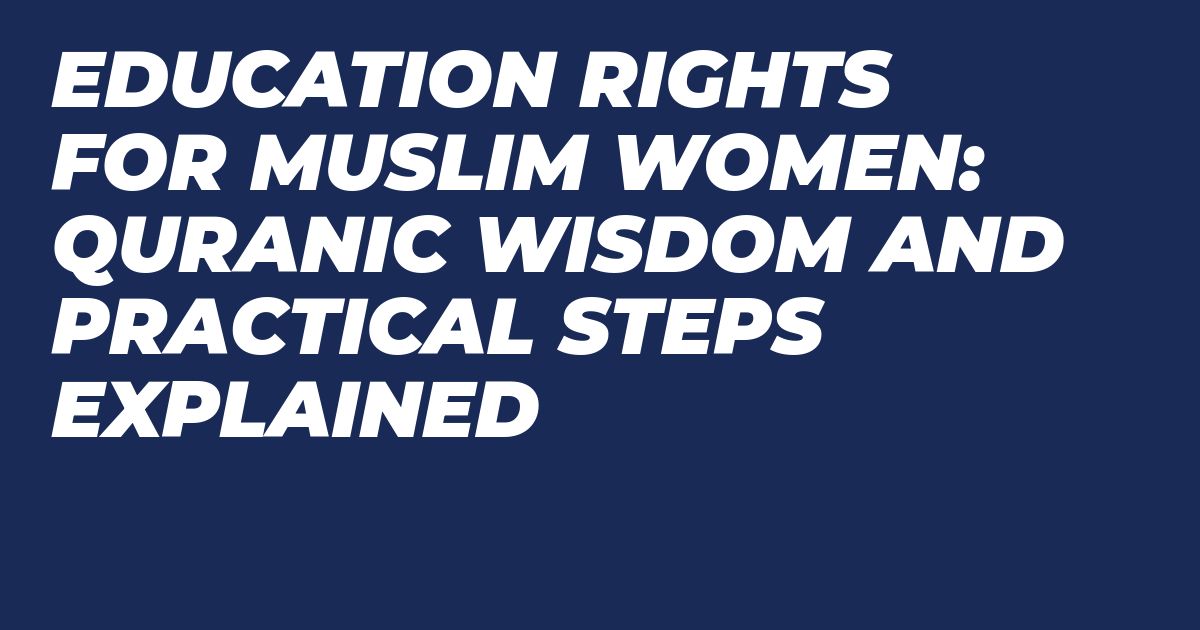Education Rights for Muslim Women: Quranic Wisdom and Practical Steps Explained
Many people wonder what the Quran really says about education for Muslim women. There’s a lot of confusion, and some myths still hold strong even today. When you look at the scripture itself, you find something refreshing: Islam calls on everyone, women included, to seek knowledge.
Quranic guidance isn’t just for the past. It carries real weight for modern families thinking about the future of their daughters, sisters, and communities. This post will clear up common myths, show why Islam stands for equal access to education, and offer practical steps for parents and leaders. Get ready to rethink what you know about women’s rights in Islam and find clear ideas you can use to support education for all.
Watch a short video for more context: Women’s Rights in Islam | Quranic Teachings Explained
Quranic Foundations for Education Rights
The Quran holds strong guidance about the value of education, and this guidance is meant for every human being, regardless of gender. The emphasis on learning starts from the very first revelation given to Prophet Muhammad, highlighting that the pursuit of knowledge is a sacred duty for all. Let’s explore some crucial Quranic verses and Prophetic teachings that underline education as a right and responsibility for Muslim women, as well as men.
The First Revelation – “Read!” (Iqra)
The very first word revealed to Prophet Muhammad was “Iqra”, which means “Read” or “Recite”. This command came through the Angel Gabriel, urging him to read in the name of God, the Creator. This moment is powerful because it sets the tone for the entire Islamic message: knowledge is the starting point of spiritual and personal growth.
The verses say:
“Read in the name of your Lord who created—
Created man from a clinging substance.
Read, and your Lord is the most Generous—
Who taught by the pen—
Taught man that which he knew not.”
(Quran 96:1-5)
These lines emphasize that knowledge is not just about information but an act connected deeply to the divine. The command to “Read” is universal and not limited by gender, social class, or age. It invites every person to embark on a lifelong journey of learning and discovery.
Verse 96:23 – Seeking Knowledge Is a Duty
The Quran explicitly stresses the importance of seeking knowledge as a duty. Surah Al-`Alaq’s early verses make it clear that acquiring knowledge is a moral obligation, rooted in the idea of being taught by God Himself. While the verse doesn’t mention gender specifically, the broader Quranic context confirms that the call for learning applies equally to men and women.
This verse confirms that knowledge is a blessing and a right that belongs to all humans, regardless of gender. Learning is a responsibility. If you think about it, knowledge shapes how societies grow and thrive, and Islam encourages everyone, including Muslim women, to be active participants in this learning process.
Prophetic Hadith on Knowledge for Men and Women
The teachings of the Prophet Muhammad also reinforce the Quran’s message about education rights. One of the most well-known hadiths states:
“Seeking knowledge is obligatory for every Muslim.”
(Sunan Ibn Majah, Book of Sunnah, Hadith 224)
The crucial point here is the word “every”. It does not exclude women or any group. The Prophet was clear that education and knowledge are not privileges but obligations for all Muslims. This hadith makes it evident that Islam supports equal access to education for women and encourages their active involvement in learning.
Understanding these Quranic and Prophetic foundations helps break down myths that education for Muslim women is secondary or optional. It’s clear that Islam values their right and duty to seek knowledge on the same level as men.
For a deeper understanding of the first revelation and its impact on education, this detailed tafsir on Surah Al-‘Alaq offers valuable insights.
Historical Examples of Educated Muslim Women
The history of Islam is rich with examples of women who played significant roles in education and scholarship. These women not only embraced knowledge themselves but also paved the way for others by teaching, founding institutions, and leading in various fields. Their stories challenge misconceptions and show how Muslim women have been active contributors to learning and intellectual growth throughout the centuries.
Aisha bint Abu Bakr – Scholar and Narrator
Aisha bint Abu Bakr, the wife of Prophet Muhammad, stands out as one of the most important female figures in early Islamic scholarship. Renowned for her brilliant mind and sharp memory, she transmitted over 2,000 hadiths—sayings and actions of the Prophet—that remain key sources of Islamic law and ethics today. Aisha was not just a transmitter but an influential teacher, respected by many companions and later scholars who sought her guidance on religious and legal matters.
Her home became an informal school where she taught both women and men, drawing large circles of students eager to learn about the Prophet’s teachings. Her role in preserving and communicating Islamic knowledge highlights the value placed on educated women in early Islam. You can read more about her remarkable contributions here.
Fatimah al‑Fihri – Founder of al‑Qarawiyyin University
Fatimah al-Fihri was a visionary woman who turned her inheritance into a lasting educational institution. In the 9th century, she founded the al-Qarawiyyin Mosque and university in Fez, Morocco. This university is often credited as the oldest continually operating degree-granting institution in the world. Fatimah’s commitment to education was not limited to religious studies; her institution became a hub for diverse knowledge including astronomy, mathematics, and philosophy.
Her establishment of al-Qarawiyyin exemplifies how Muslim women historically took initiative to create spaces dedicated to learning. Fatimah’s legacy still inspires, symbolizing the deep roots of female involvement in education. Explore more about her journey and impact here.

Photo by cottonbro studio
Modern Female Scholars and Activists
The tradition of Muslim women leading in education continues strongly today. From universities to community activism, many women are shaping academic and social landscapes. Here are three notable figures to keep in mind:
- Amina Wadud: A scholar known for her feminist interpretation of the Quran, she has opened discussions about gender equality in Islam through her teaching and writing.
- Ingrid Mattson: An Islamic studies professor and former president of the Islamic Society of North America, she works tirelessly to promote interfaith dialogue and education.
- Malala Yousafzai: While not a scholar in the traditional sense, Malala’s advocacy for girls’ education worldwide has had a profound impact on how Muslim women’s education is viewed globally.
These women exemplify how modern Muslim women combine faith and scholarship to push for wider education rights and opportunities. Their work continues the legacy started by female figures in early Islamic history, proving that education and leadership are deeply connected.
For a broader view on contemporary Muslim women’s influence in education and activism, visit this resource on women scholars and activists.
This historical look offers a clear reminder: education for Muslim women is both a longstanding right and an ongoing journey, deeply rooted in Islamic tradition and carried forward by women past and present.
Common Misconceptions and Cultural Barriers
Many people misunderstand the Quran’s stance on women’s education, influenced by cultural traditions and social challenges rather than true Islamic teachings. These misconceptions create unnecessary limits on Muslim women’s opportunity to learn. To understand the real picture, it’s important to separate the teachings of the Quran from the traditions that often get mistaken for religious rules. Here’s a clear look at the most common misunderstandings and external factors that affect girls’ schooling today.
Misreading Quranic Verses
One of the biggest problems is how some interpret Quranic verses about women’s roles too narrowly. Certain verses are taken out of context to suggest that women should not pursue knowledge. For example, verses that talk about modesty or family roles are sometimes wrongly applied to restrict women’s education.
The truth is, the Quran encourages learning for all believers. The command to seek knowledge does not discriminate. Verses that talk about men and women working together or men leading in certain family matters do not imply that women should be denied schooling. Instead, these verses emphasize cooperation and respect within societal roles but never limit the right to education.
Clear, inclusive readings of the Quran show that women’s learning benefits the whole community. Limiting their education contradicts the Quran’s broader message of knowledge as a key to progress and understanding. For a deeper explanation, this paper by Yaqeen Institute breaks down five common myths about women in Islamic law.
Patriarchal Cultural Practices
Beyond misunderstandings of scripture, cultural customs often create the biggest barriers to girls’ education. These practices have deep roots but come from social traditions rather than religious teachings. Some common cultural barriers include:
- Preference for boys’ schooling over girls.
- Early marriage customs that pull girls out of school.
- Restrictive views on women’s roles within the home only.
- Community pressures that discourage girls from public learning spaces.
Many of these practices claim religious justification, but they are more about maintaining patriarchy than honoring Quranic principles. In reality, Islam’s founding figures supported the education of women and saw it as essential for the health of the family and society. Sadly, in some regions, cultural norms still override this guidance, leaving girls with fewer opportunities.
Challenging these traditions means understanding the difference between Islam as a faith and the social habits of some Muslim communities. Resources like the World of Islam’s refutation of common misconceptions provide useful insights into distinguishing culture from religion.
Economic and Safety Challenges
Even where scriptural and cultural hurdles are lower, practical issues such as poverty and safety concerns limit schooling for many Muslim girls. Families struggling financially may prioritize limited resources for boys’ education or household needs.
Transportation is another key challenge in rural or unsafe areas. Lack of safe transit to schools, fear of harassment on the way, and inadequate infrastructure can discourage families from sending girls to school regularly.
These obstacles are not unique to Muslim communities but are often compounded by local social attitudes. Addressing education rights means tackling these economic and security issues alongside cultural and religious clarity. When families feel their daughters will be safe and supported, the likelihood of continued schooling rises significantly.
Understanding these real-life barriers brings us closer to solutions where Muslim women’s right to education can be fully realized. It’s more than theology — it’s about creating safe, equitable environments for learning.

Photo by Mikhail Nilov
By clarifying these misconceptions and highlighting the true barriers, we can better support Muslim women’s education and find ways to encourage wider access to knowledge.
Legal and Policy Implications Today
Understanding education rights for Muslim women is not just about religious texts; it also involves how these rights are reflected in today’s laws and policies. Around the world, international human rights frameworks provide important standards to support education for all, while many Muslim-majority countries have developed their own national laws that draw from both Islamic teachings and international commitments. Religious leaders and community centers also play a key role by grounding advocacy in Quranic principles.
International Human Rights Standards
The right to education for all, including Muslim women, is clearly supported by international human rights agreements such as the United Nations’ Universal Declaration of Human Rights (UDHR) and related treaties. These documents state that everyone should have free and equal access to education regardless of gender, religion, or background. Muslim-majority countries are often signatories to these conventions, which establish a framework for governments to guarantee schooling for girls and women.
However, challenges arise in fully implementing these rights while respecting Islamic values. Many scholars and policymakers argue that Quranic guidance encourages education for both men and women, so there should be no conflict. The Quran commands seeking knowledge and stresses equality in learning; thus, Muslim nations can and do align their human rights commitments with Islamic law. This alignment can be supported by:
- Recognizing that Islamic principles honor education as a right and a duty for all believers.
- Ensuring policies respect cultural and religious contexts without excluding women.
- Using interpretations of Quranic verses that promote learning and justice to back girls’ access to education.
This balance helps Muslim countries meet their international obligations while grounding policies in their cultural and religious identities. For more on the intersection of Islamic values and international human rights, see this comprehensive analysis from Brookings Institution.
National Education Policies Referencing Islam
Many Muslim-majority nations have created education laws and frameworks that explicitly reference the Quran and Islamic teachings to emphasize girls’ and women’s right to learn. Governments use Quranic verses in their official documents to underline that education is not only compatible with Islam but actively encouraged by it. Here are a few examples:
- Pakistan’s National Education Policy cites Quranic injunctions affirming education as a universal right, promoting female literacy and equal schooling.
- Indonesia’s Basic Education Law connects the right to education with the Quranic exhortation to seek knowledge, affirming gender equality in educational access.
- Jordan’s Education Act references specific verses encouraging learning and highlights women’s role in society through education.
These examples show how religious texts are woven into legal language to remove doubts and bolster public support for girls attending school. They reflect a growing recognition that Islamic teachings support and demand education for all Muslims, regardless of gender. The Quran’s role in these laws makes education a shared community value rather than merely a government mandate.
You can read a scholarly examination of how Islamic law aligns with national and international education rights in this student research paper.
Role of Religious Leaders and Mosques
Religious leaders, especially imams, and mosques have a unique influence in their communities. Their teachings and public speeches often shape how families and societies view education for girls. When mosque leaders use Quranic verses and the teachings of Prophet Muhammad to advocate for education, they help build strong grassroots support.
Common scriptural references used by imams include:
- The command to “Read” and “Seek knowledge” found in Surah Al-`Alaq.
- The hadith that knowledge is obligatory for every Muslim, male and female.
- Quranic examples showing women as scholars and teachers during the Prophet’s time.
Many mosques organize educational programs and community discussions to encourage parents to support their daughters’ schooling. By framing education as a religious duty and a means to empower the community overall, religious leaders help break down social barriers and challenge outdated cultural practices that limit girls’ educational opportunities.
Mosques also serve as safe spaces where Islamic values and modern educational goals can coexist peacefully. This practical support plays a crucial role in fostering environments where Muslim women feel confident and motivated to learn.
An insightful resource on engaging religious leaders in education advocacy can be found here.
This section highlights the important interplay between international rights standards, national laws grounded in the Quran, and active religious leadership—all crucial for expanding education rights for Muslim women today.
Practical Steps to Promote Education for Muslim Women
Encouraging education for Muslim women calls for thoughtful action that combines faith, support, and practical tools. Families, schools, and communities can play a powerful role in this process by emphasizing Quranic teachings and creating environments where girls feel motivated and safe to learn. Here are some grounded steps that connect scripture with real-world solutions.
Family Conversations Using Quranic Arguments
Parents hold great influence when it comes to supporting girls’ education. Opening honest, respectful talks at home can clarify doubts and inspire a commitment to learning. Families can draw directly from the Quran and hadith to frame education as a shared, sacred duty:
- Highlight knowledge as a divine command: Remind loved ones that the first revealed word was “Iqra” (Read), which applies universally. The Quran states:
“Read in the name of your Lord who created” (Quran 96:1)
This sets education as a spiritual priority for both sons and daughters. - Use Prophetic teachings: The saying, “Seeking knowledge is obligatory for every Muslim” (Sunan Ibn Majah), stresses that education is not optional or gender-exclusive.
- Show historical examples: Refer to respected Muslim women scholars like Aisha (may Allah be pleased with her), who taught and transmitted knowledge and had a major role in preserving Islamic teachings.
- Emphasize family and community benefits: Explain that educated women contribute to stronger families and societies, which is in line with Quranic values of welfare and cooperation.
These conversations reduce misunderstandings influenced by culture and encourage families to invest confidently in daughters’ education by keeping faith at the heart of the discussion.
Scholarships, Mentorships, and Peer Networks
Financial and social support can remove barriers that limit women’s access to education. Several programs and strategic approaches empower girls and women to pursue schooling without fear or hesitation:
- Scholarships: Look into organizations offering financial aid specifically for Muslim women. Scholarships help cover tuition fees, books, and other essentials, taking pressure off families. These can often be found in local community centers, Islamic foundations, or global programs supporting girls’ education.
- Mentorship programs: Connecting girls with female role models and mentors who share similar faith and cultural backgrounds makes a big difference. Mentors provide guidance, encouragement, and practical advice, helping students navigate academic and personal challenges.
- Peer networks: Creating or joining learning groups fosters a sense of belonging and motivation. Peer groups encourage discussion, shared goals, and collaboration, which make education more engaging and less isolating.
Nonprofits, mosques, and schools can establish or promote these resources to create lasting support systems. Together, they help Muslim women build confidence and a strong foundation for lifelong learning.
Safe School Environments and Online Learning Options
Safety and comfort directly affect whether girls stay in school. To encourage Muslim women to pursue education without worry, the environment must be welcoming, secure, and respectful of their needs:
- Gender-sensitive facilities: Schools should provide private spaces, separate restrooms, and dress-code policies that respect modesty as valued in many Muslim communities. These adjustments reassure families that cultural and religious concerns are honored.
- Trained staff: Teachers and administrators who understand and respect Islamic values create a more inclusive atmosphere. Sensitivity training helps avoid discrimination and builds trust with students and parents.
- Safe transportation: Ensuring that travel routes to and from school are safe and accessible can reduce dropout rates related to safety fears. Community carpooling or school buses may be options.
- Online learning: Virtual classrooms and remote courses offer a flexible alternative for girls who face obstacles attending physically. These platforms can be especially useful in conservative or remote areas and have expanded greatly worldwide.
Combining safe physical environments with digital options helps bridge gaps and creates more possibilities for Muslim women to claim their right to education without compromise.

Photo by MD Photography
These practical steps pave the way from Quranic ideals to real progress in education for Muslim women. When families, communities, and institutions align efforts and values, learning thrives and barriers fall away.
For additional resources on girls’ education and Islam, see this detailed study on girls’ education and Islam, which explores Quranic foundations alongside modern strategies.
Conclusion
The Quran clearly supports education for Muslim women as a right and a duty, rooted in its first revealed command to read and seek knowledge. Historical examples, from Aisha’s scholarship to Fatimah al-Fihri’s educational legacy, show women’s active role in learning from Islam’s earliest days. Many common misconceptions and cultural barriers wrongly restrict Muslim women’s access to education but don’t reflect Quranic teachings.
Practical steps—open family conversations, scholarships, safe schooling, and community support—can help turn these rights into reality today. Empowering Muslim women through education strengthens families and communities while fulfilling core Islamic principles. Let’s keep the focus on knowledge as a shared duty, unlocking opportunities for growth and positive change in every generation.




